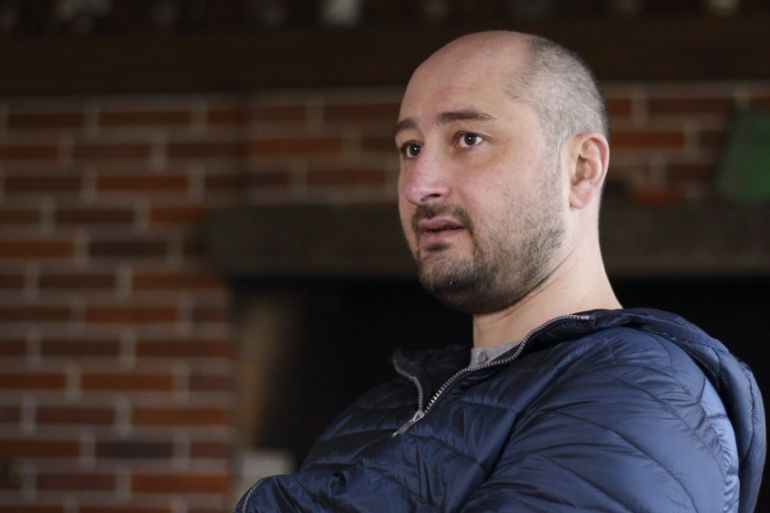Russian journalist Arkady Babchenko shot and killed in Kiev
Ukrainian police investigating journalist’s death said they suspect the murder is linked to his work.

A prominent Russian journalist and vocal critic of President Vladimir Putin has died after being shot in Kiev, Ukraine‘s capital.
Ukrainian police said on Tuesday Arkady Babchenko succumbed to his wounds on his way to the hospital. His wife found him earlier bleeding at their apartment building and called an ambulance.
Keep reading
list of 4 itemsJournalist loses foot after being badly wounded in Israeli attack in Gaza
The Take: Layoffs are decimating the media industry. Who profits?
Media feel pressure to tell ‘positive’ China story as party tightens grip
The 41-year-old had multiple gunshot wounds on his back.
Police investigating Babchenko’s killing said they suspect the crime is linked to his work.
“The leading and obvious line of inquiry is that of his professional activities,” Andriy Kryshchenko, Kiev police chief, told Interfax Ukraine news agency.
Babchenko, one of Russia‘s best-known war correspondents, left his country in February 2017, saying he was receiving threats and he was concerned he might be jailed.
He served in the Russian army during the first separatist war in Chechnya during the 1990s and later became a journalist. He worked as a military correspondent for several Russian media outlets.
In the autumn, Babchenko moved to Kiev, where he worked as a host for the Crimean Tatar TV station, ATR.
Ukrainian Prime Minister Volodymyr Groysman said in a social media posting late on Tuesday that he was convinced “the Russian totalitarian machine” had not forgiven Babchenko for what Groysman called his honesty.
Russian Foreign Minister Sergei Lavrov rejected allegations that Moscow was behind the murder of the journalist, calling it part of an anti-Russian campaign, the TASS news agency reported.
Alexander Bortnikov, head of Russia’s Federal Security Service (FSB), said Ukrainian allegations the FSB was behind the killing of Babchenko were nonsense and a provocation, the Interfax news agency reported on Wednesday
‘And so it began’
Harlem Desir, the media freedom representative at the Organization for Security and Cooperation in Europe, said he was “horrified” by Babchenko’s death.
“I call on Ukraine authorities to conduct immediate & full investigation,” he said on Twitter.
Some of Babchenko’s articles and posts outraged many Russians. In one Facebook post, he said he felt no regret about the deaths of Russian army choir members and others from a December 2016 plane crash as they were heading to perform before Russian troops in Syria.
He was denounced by pro-Putin politicians and some called for stripping Babchenko of his Russian citizenship.
|
|
“I didn’t call for anything or insult anyone. I just reminded my readers that Russia was indiscriminately bombing Aleppo, without recognising that dozens of children were dying in those bombs, their photographs making their way around the world. I also called Russia an aggressor,” Babchenko wrote in an article published in The Guardian.
“After all these wars and deaths, I felt only one thing when I heard that the representatives of Russia’s military had died: indifference. But for some, expressing this on Facebook was not patriotic enough. And so it began.”
Among the plethora of threats and accusations, a “pro-government ultranationalist” TV channel had listed Babchenko as number 10 on its list of “Top 100 Russophobes”.
Two years ago Pavel Sheremet, a Belarussian journalist known for his criticism of his home country’s leadership and his friendship with the slain Russian opposition leader Boris Nemtsov, was blown up in a car bomb in central Kiev.
“Putin’s regime is aimed at those who cannot be broken or intimidated,” Anton Gerashchenko, a Ukrainian lawmaker and adviser to the interior minister, wrote on Facebook.
“Today in Kiev on the threshold of the apartment where he lived, a famous Russian journalist Arkady Babchenko was shot and killed, a consistent opponent of the Putin regime and a friend of Ukraine.”